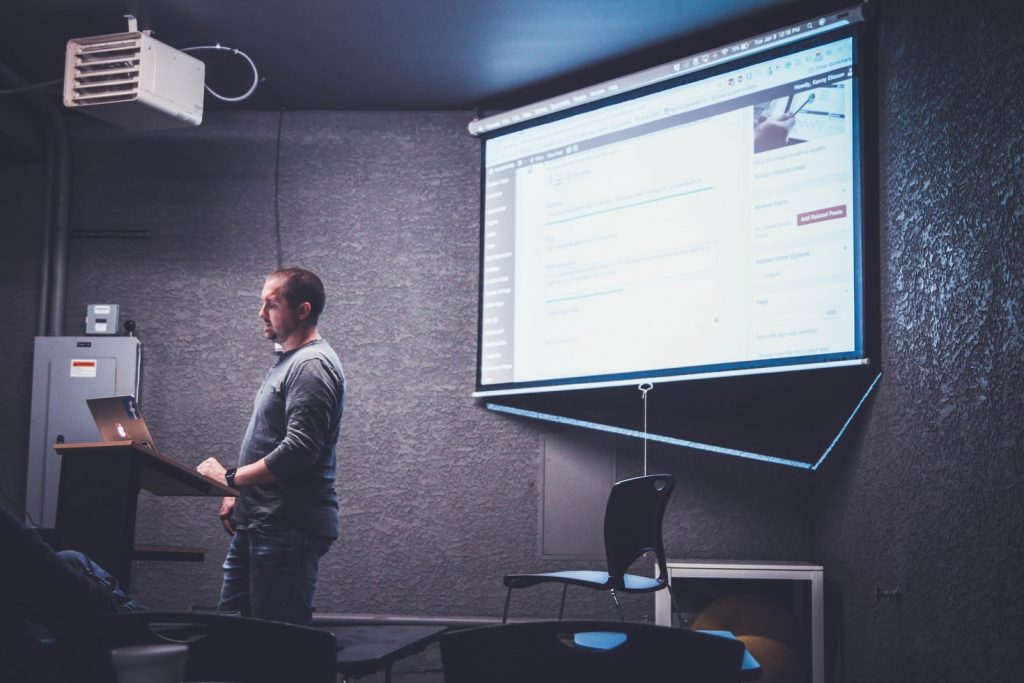We are big fans of frequent code demos when learning programming. Here are the most important reasons.

Our schools are always full of life and buzzing with energy, but some Fridays (a.k.a. the Demo Days) are particularly special. Students gather in the classrooms and wait patiently for their cues to step in front of the class. They’ve worked and practiced for a week to get to this point. And it’s finally time to present their best work in front of an audience!
Demos are an opportunity for our students to present their finished development projects and individual skills. After all, they complete 30+ projects during our full-stack development course. There’s a ton of progress to see and keep track of! But there’s more to uncover here. Product demos have benefits in the learning process and can directly help Codecoolers get a new tech job.
Before we get into the main benefits, let’s get up to speed on what demos are, and explore when and how our students have demos in their learning journeys:
Table of Contents
Client demos at the workplace and at Codecool
In agile software development, demos are key parts of sprints. They provide an opportunity for teams to get feedback on their product, so they can quickly respond by adjusting and course-correcting. Furthermore, they can highlight particular successes, thus boosting stakeholders’ trust in the development team.
Demos can improve collaboration, build a culture of trust with partners, boost team morale, and improve the product’s quality. And we’re keen on bringing all these benefits – and even more – into our method to help our students grow.

At Codecool, we believe in a more practice-oriented and tailor-made education system, one that brings learning closer to the demands of a real workplace.
We use Scrum ceremonies and build on agile principles in the learning process, so Codecoolers will have relevant experience in agile software development when they’re looking for their new job.
Plus, our students have alternating Self-Instructed (SI) and Teamwork (TW) weeks. This helps them master individual learning and team-oriented work too. On TW weeks, they plan, work, and demo finished products together, just like any professional development team would. So demos are a type of “closing ceremony” to TW weeks.
In the first ‘Progbasics’ module of the full-stack development course, mentors are the ones giving feedback to students. Then, in the latter modules, Codecoolers learn to evaluate each other’s work, which creates an amazing feedback culture. However, at any point of the course in any module, real clients from our partner companies could hop in to check out Codecoolers’ work.
All this creates a lot of potential for students to progress at coding and in their personal development too:
1. Demos are a celebration of work well done
It’s easy to get lost in a learning path if there’s no thought-out structure and a feedback loop in it. There are so many technologies and even possible frameworks you could learn, and everybody progresses at different rates. There’s no cookie-cutter way to becoming a developer. But lifelike projects, agile practices, and especially demos provide a structure to the learning journey. Plus, they’re the best way to see the results of your work in real time and gather experience in coding.
Just like with professional development teams, students have to plan and execute their work schedule and prepare a nice presentation to show how they worked during the week. All this will “force” everybody in the team to think in terms of deadlines, which is an essential practice in any work environment.
What’s more, students can have the experience of doing entire sprints and then seeing their product come to life. They learn to write effective, clean code and have their work evaluated on many levels, by mentors, teammates, and even real clients.
On top of evaluating work, demos give space to think through the key takeaways from any project, and to share the learnings with the entire class. This isn’t only useful to the team that presents, but to everybody in the module. These are experiences that everybody can learn from and possibly use in their future careers. Seeing what worked and what did not and drawing a lesson from mistakes is a wonderful attitude to have in all walks of life.
Demos also provide an opportunity to get feedback on their product which is essential to get used to. Development teams do the same all the time! Learning to implement feedbacks will improve the quality of products, accelerate the learning process, and help to build a growth mindset.
So demos are fantastic opportunities to learn from, especially to get ready for effective teamwork. But on a more individual level, there are several soft skills that demos help to improve:
2. Demos help you build amazing soft skills
The difference between an average developer and an amazing one that companies want to hire right away often lies in soft skills. And demos help a great deal to improve the most important ones:
- Teamwork
Codecoolers tackle demo days in teams. All 2-3 members of the project delivery team gathers in front of the audience to demo their working product, and each of them take their part in the presentation. It starts with an introduction, then they explain how they worked together during the project as a team, share their learnings and then, obviously, show and explain the result of their shared effort, the working code. Finally they collect feedback on their work as a team. - Creative problem solving
As students build a product they can encounter several problems and hardships. Thus, they’ll be forced to deal with challenges creatively. During demos, it’s essential to highlight the encountered hardships and show how they approached them. This adds an opportunity for students to evaluate their performance, and to learn from them to improve their problem-solving skills. - Assertive communication
Developers aren’t just working alone in dark corners, and they need great interpersonal skills to do their job effectively. Reporting to project managers, dealing with coding issues, and coordinating with clients all require assertive, effective communication skills. So while students work together and prepare for their demos, they learn to communicate and work together effectively. - Time management
Developers need to learn to adhere to deadlines, sprint plans and must be able to prioritise in their schedules. To do this well they need great time management skills, which is a skill best learned through practice. Planning and sticking to their sprint plans teaches students this skill super effectively. - Presentation and storytelling
Pro developers have to present their work often. To management, to teammates, and to clients even. You’ll need a strong presentation and also some storytelling skills to get your message across to your audience. Naturally, demos help to build these skills because they create a safe environment to practice presentation skills. We know that speaking in front of an audience is uncomfortable to some, but it’s best to get ready for it beforehand, in the most effective way possible.
On top of all this, you also get to practice English at demos. They are always in English, because the language of work at most of our hiring partner companies is English, and we want to simulate a real work environment as much as possible. After a year of regularly presenting in English at Codecool, our graduates are really comfortable doing the same in their new jobs later on.

3. Demos can land you your new tech job
Students have the chance to demo their work in front of real clients, are representing our corporate hiring partners. Showing their work to their possible new employers is a unique experience in itself, one that not many beginner developers can have.
Our partners have the freedom to visit Codecool any time, so they can see what the Codecool vibe is like and gather experience about their possible future developers. They can check our method, see how it works in action, and get to know our amazing Codecoolers. Sometimes our partner companies pick students based on demos, deciding to give them an offer even before they finish the course. So being on top of their games at demos and putting their presentation skills to work can mean a new position at a tech company for Codecoolers.
Furthermore, students benefit from client demos a great deal because they can get to know their future employers. They can ask questions about their business, their teams, and company culture, so they can get a more in-depth view of the hiring partner too.
Ready to start your coding journey?
It’s super exciting to learn to code and to start a new tech career. And we’re here to help you make the first steps if you need some guidance.
During our full-stack development course, you’ll learn the most important, in-demand skills, and we can take you to a guaranteed tech position in a year. With 4-6 programming languages, your own project portfolio, and great soft skills under your belt, you’ll land your dream job in no time. Plus you’ll get to do product demos frequently in front of real clients. Sounds nice?
You don’t need special skills or previous knowledge to start! Plus, you can choose our post-payment option for the full-stack course, and pay the fee when you’re already earning a salary in tech, in convenient, monthly instalments.
If you have any questions or need additional info regarding our courses, reach out! We’re super happy to hear from you.